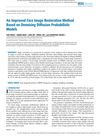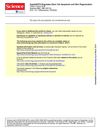 25 citations,
January 2006 in “Pharmacoepidemiology and drug safety”
25 citations,
January 2006 in “Pharmacoepidemiology and drug safety” SSRIs can cause hair loss, especially sertraline, with higher risk in women.
 April 2017 in “European Psychiatry”
April 2017 in “European Psychiatry” An older woman had false beliefs after taking a depression medication, which stopped when she stopped the medication.
 October 2016 in “Iranian journal of psychiatry and behavioral sciences”
October 2016 in “Iranian journal of psychiatry and behavioral sciences” Sertraline, an antidepressant, may cause hair loss in rare cases.
 October 2008 in “Journal of Intellectual Property Law & Practice”
October 2008 in “Journal of Intellectual Property Law & Practice” The article concludes that recent legal rulings have strengthened the protection of pharmaceutical patents against generic competition.
 December 2018 in “Reactions Weekly”
December 2018 in “Reactions Weekly” Some medications may cause lasting sexual dysfunction.
 55 citations,
December 2006 in “Journal of The American Academy of Dermatology”
55 citations,
December 2006 in “Journal of The American Academy of Dermatology” Antidepressants called SSRIs can cause skin problems, bleeding risk, and other side effects.
 41 citations,
March 2010 in “Psychology Research and Behavior Management”
41 citations,
March 2010 in “Psychology Research and Behavior Management” Using psychological treatments can help manage skin conditions along with regular medical care.
 31 citations,
October 2013 in “Psychosomatics”
31 citations,
October 2013 in “Psychosomatics” Psychotropic medications can cause skin reactions, including severe conditions like SJS and TEN, and it's important for psychiatrists to recognize and manage these side effects.
 5 citations,
February 2010 in “Expert Review of Dermatology”
5 citations,
February 2010 in “Expert Review of Dermatology” Treating both the mind and skin together, especially by managing stress, can greatly improve outcomes for skin disorders linked to psychological issues.
 2 citations,
October 2002 in “American Journal of Nursing”
2 citations,
October 2002 in “American Journal of Nursing” Taking the same medication under different brand names caused harmful side effects.
 December 2006 in “The Brown University Psychopharmacology Update”
December 2006 in “The Brown University Psychopharmacology Update” Second-generation antipsychotics offer no significant benefit over first-generation ones for schizophrenia.
 March 2002 in “Clin-Alert”
March 2002 in “Clin-Alert” In 2002, various drugs caused serious side effects, including vitamin B12 deficiency, heart issues, blindness, hypersexuality, allergic reactions, blood clotting problems, pupil dilation, capillary leak syndrome, muscle breakdown, hepatitis, skin reactions, and lupus.
 1 citations,
January 2024 in “IEEE access”
1 citations,
January 2024 in “IEEE access” The new method improves facial image restoration quality and face recognition accuracy.
 January 2018 in “Stem cell biology and regenerative medicine”
January 2018 in “Stem cell biology and regenerative medicine” ATP-dependent chromatin remodeling is crucial for skin development and stem cell function.
 32 citations,
June 2015 in “PLOS ONE”
32 citations,
June 2015 in “PLOS ONE” Olive leaf compound oleuropein helps grow hair in mice.
 18 citations,
July 1975 in “Clinical Pharmacology & Therapeutics”
18 citations,
July 1975 in “Clinical Pharmacology & Therapeutics” Oral minoxidil effectively controls blood pressure quickly and safely.
 688 citations,
June 2007 in “Cell Stem Cell”
688 citations,
June 2007 in “Cell Stem Cell” Removing the ATR gene in adult mice causes rapid aging and stem cell loss.
 348 citations,
July 2017 in “Skin appendage disorders”
348 citations,
July 2017 in “Skin appendage disorders” Platelet-rich plasma shows promise for skin and hair treatments but needs more research and standardization.
 242 citations,
February 2016 in “Science”
242 citations,
February 2016 in “Science” Hair loss and aging are caused by the breakdown of a key protein in hair stem cells.
 170 citations,
September 2019 in “Evidence-based Complementary and Alternative Medicine”
170 citations,
September 2019 in “Evidence-based Complementary and Alternative Medicine” Some medicinal plants can help heal wounds and may lead to new treatments.
 130 citations,
October 2006 in “Allergy”
130 citations,
October 2006 in “Allergy” Allergic reactions to blood thinners are rare but can be serious, requiring careful testing and alternative treatments.
 128 citations,
March 2006 in “American Journal of Pathology”
128 citations,
March 2006 in “American Journal of Pathology” Prolactin contributes to hair loss by promoting hair follicle shrinkage and cell death.
 109 citations,
December 1998 in “The Journal of Dermatology”
109 citations,
December 1998 in “The Journal of Dermatology” Manipulating the catagen and telogen phases of hair growth could lead to treatments for hair disorders.
 106 citations,
July 2013 in “Advances in wound care”
106 citations,
July 2013 in “Advances in wound care” UV radiation can help sterilize wounds and promote healing but requires careful use to avoid damaging cells.
 93 citations,
April 2003 in “Proceedings of the National Academy of Sciences of the United States of America”
93 citations,
April 2003 in “Proceedings of the National Academy of Sciences of the United States of America” Fatty acid transport protein 4 is essential for skin and hair development.
 92 citations,
November 2003 in “The Journals of Gerontology”
92 citations,
November 2003 in “The Journals of Gerontology” Testosterone supplements can increase muscle mass and strength in older men with low levels, but long-term effects and risks need more research.
 90 citations,
October 1996 in “Dermatologic Clinics”
90 citations,
October 1996 in “Dermatologic Clinics” Growth factors are crucial for hair development and could help treat hair diseases.
 78 citations,
June 2013 in “Science”
78 citations,
June 2013 in “Science” Mice without the Sept4/ARTS gene heal wounds better due to more stem cells that don't die easily.
 78 citations,
March 1987 in “Journal of The American Academy of Dermatology”
78 citations,
March 1987 in “Journal of The American Academy of Dermatology” Minoxidil promotes hair growth but stops working when discontinued.
 65 citations,
May 2017 in “Advances in wound care”
65 citations,
May 2017 in “Advances in wound care” Toll-like receptors are important for wound healing, but can slow it down in diabetic wounds.






























